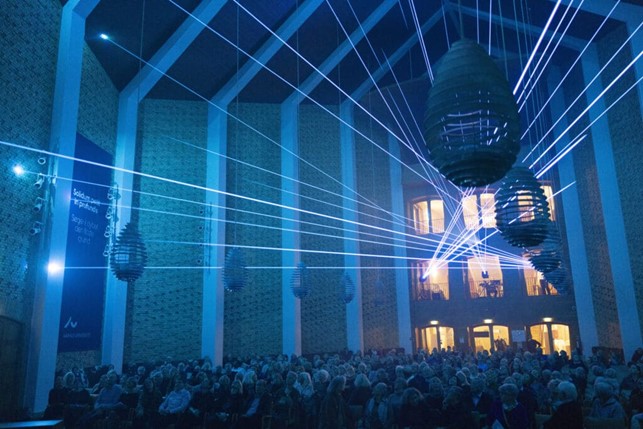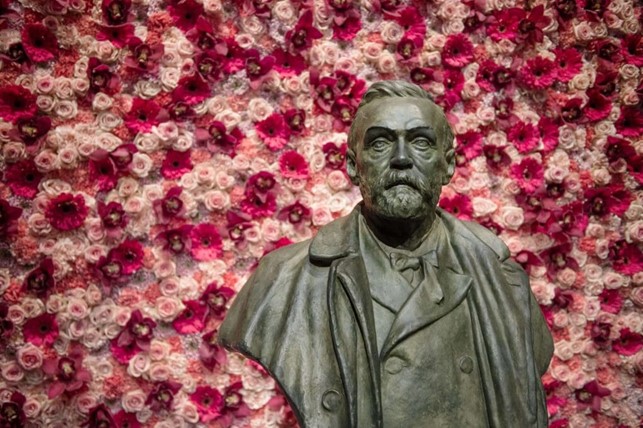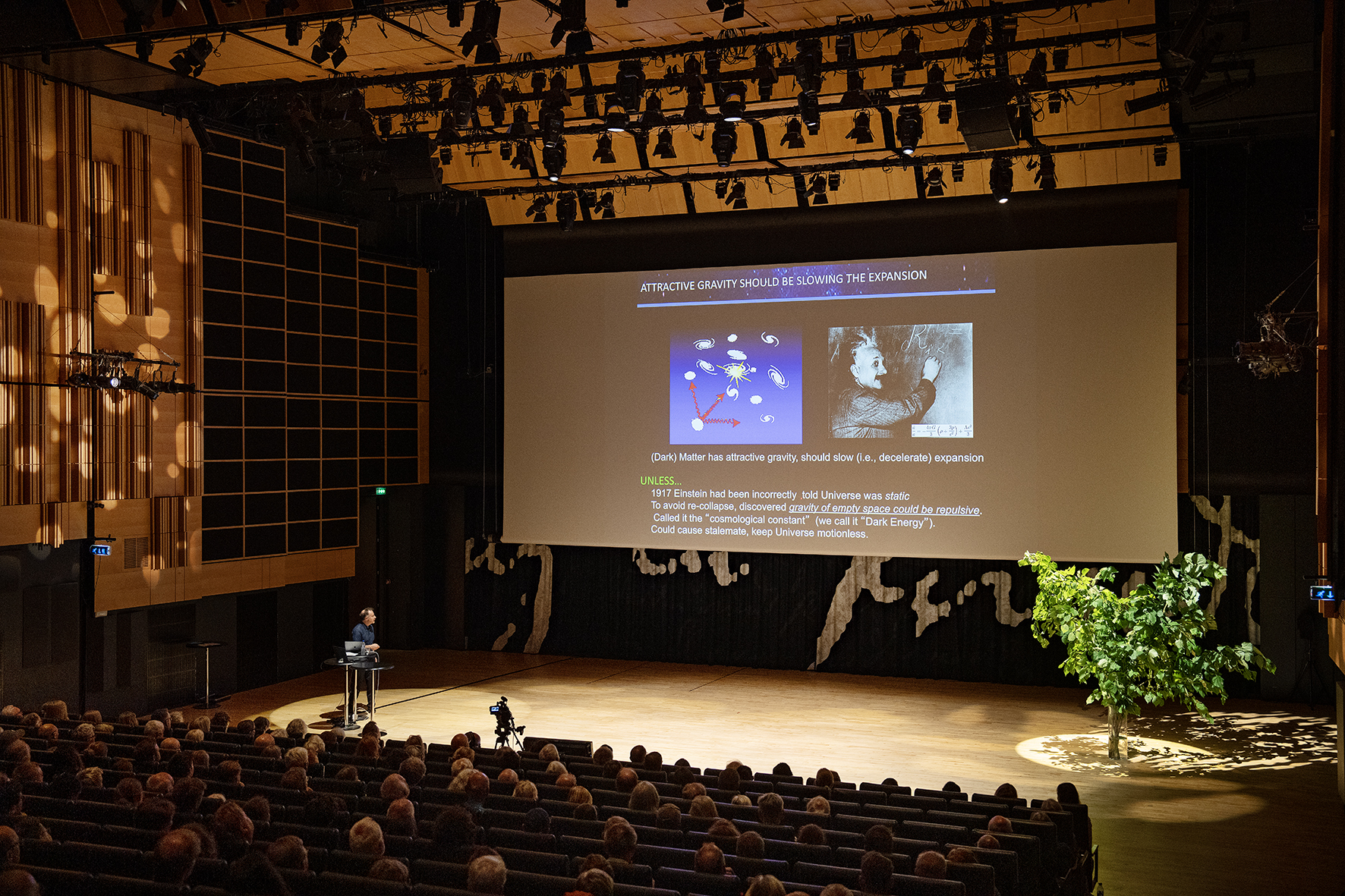150 years with Marie and August Krogh
The Royal Danish Academy of Sciences and Letters celebrates two powerful voices in Danish basic research and research policy
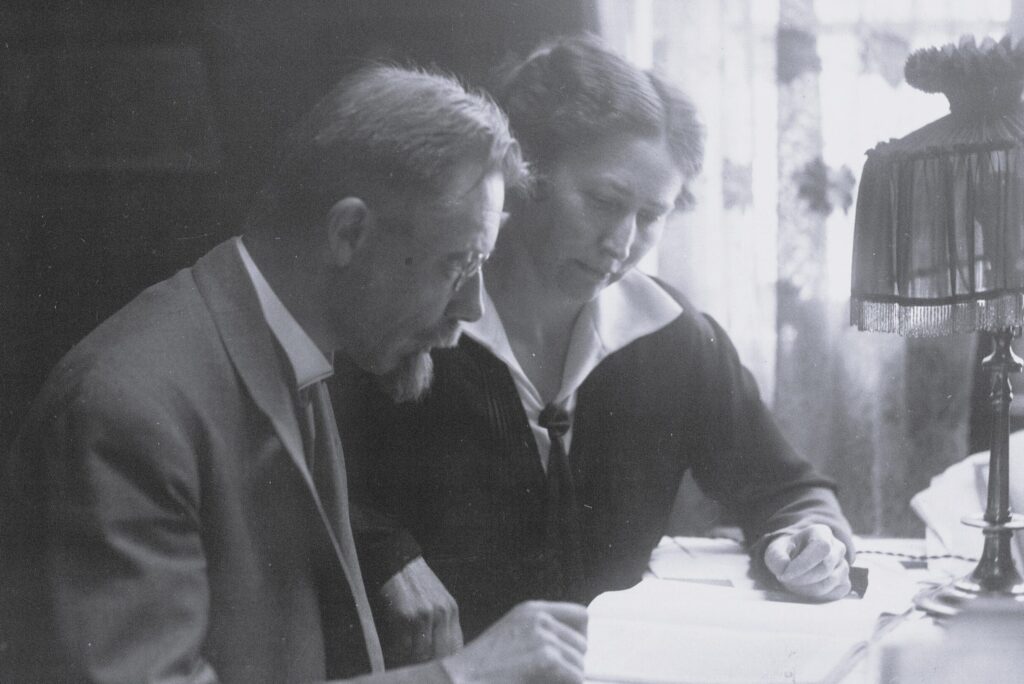
This month and next, the Royal Academy will highlight the significance of the Kroghs to the research world by holding scientific lectures and discussions in honour of their birthdays in November and December. Five Royal Academy members whose own research draws on this accomplished couple’s work are behind the initiative.
By Rikke Reinholdt Petersen
– “Marie and August Krogh are undoubtedly among the most important researchers Denmark has ever had. They are also of immense interest for other reasons beyond their research results, which alone are ample reason to celebrate them,” explains Professor Stine Helene Falsig Pedersen, University of Copenhagen.
Pedersen is one of a group of five planning the Krog celebration that includes Professor of Zoophysiology Tobias Wang Nielsen, Aarhus University; Professor of Integrative Medicine and Chief Physician Bente Klarlund Pedersen, Rigshospitalet – Copenhagen University Hospital; Professor of Geology Minik Rosing, University of Copenhagen; and Professor Liselotte Højgaard, MD, Rigshospitalet – Copenhagen University Hospital, University of Copenhagen and Technical University of Denmark. The festivities will commemorate the 150th anniversary of August Krogh (15 November) and Marie’s (25 December) births in 1874.
The razzle-dazzle will primarily include five public lectures on the Kroghs and the era in which they lived and did research. Topics will include the first female doctors in Denmark, the couple’s importance in contemporary research on exercise and nutrition and especially the crucial role they played in bringing insulin to Denmark. The lectures will take place in the Royal Academy’s Lecture Hall, with the first event scheduled on 12 November and the last one on 2 December.
Christiansborg Day spotlights research and the public
According to Pedersen one of the aims of the upcoming celebration is to take a closer look at the Kroghs’ emphasis on the interplay between basic research and societal applications:
– “Marie and August Krogh were passionate about both basic research and practical solutions to societal problems. They were also overwhelmingly successful with regard to both,” she clarifies, continuing that:
– “They had strong opinions about the importance of mutual respect and understanding between researchers and society and about the necessity of researchers both being involved in society and having sufficient free funding to do basic research.”
Pedersen says that this is the reason why the event taking place in the Christiansborg Common Hall on 11 November will boast four presentations and a panel debate exploring “How progress occurs when we create optimal conditions for both society and basic research”.
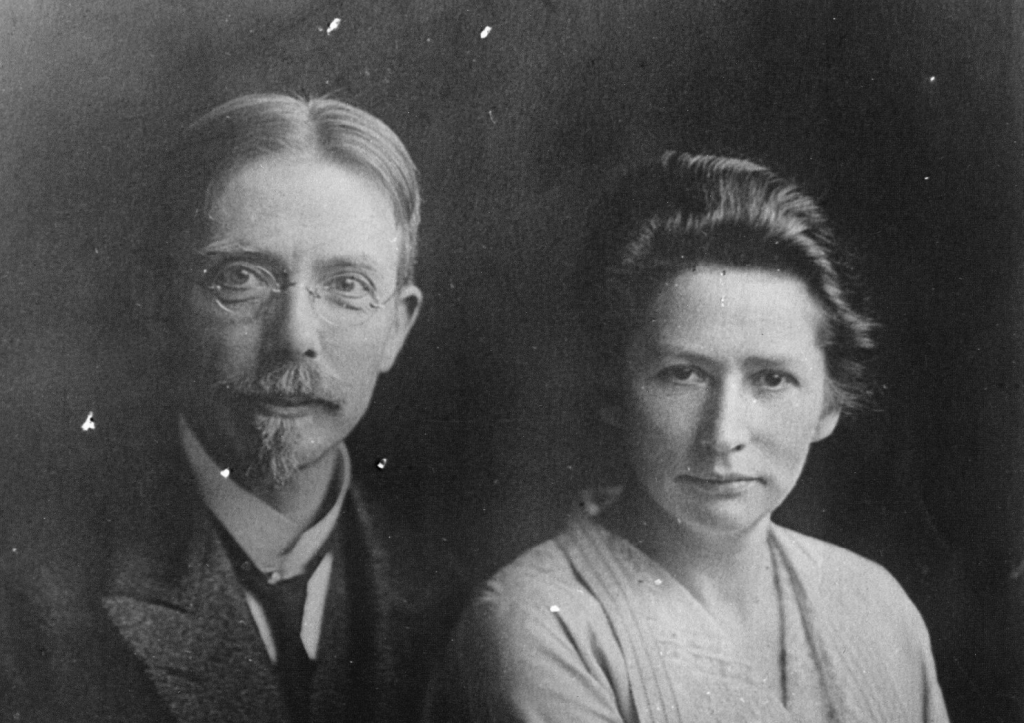
The panel, which will discuss topics related to contemporary Danish society and its attitudes toward basic research, comprises research spokesperson and member of the Danish Liberal Party Stinus Lindgreen; Executive Chief Scientific Officer of Villum Foundation and Professor Thomas Bjørnholm; Professor Jesper Svejstrup, Department of Cellular and Molecular Medicine, University of Copenhagen; Head of Centre, member of the Danish Council for Research and Innovation Policy and Professor Mette Birkedal Bruun; and Chief Physician and Professor Bente Klarlund Pedersen. Journalist Lotte Folke Kaarsholm will be the moderator.
Exceptional researchers and a legendary couple
In addition to the significant amount of time the Kroghs spent devoted to involving themselves in the interaction between basic research and society, they dedicated much of their careers to the lab, producing groundbreaking results and insights:
– “August Krogh is regarded as the founder of zoophysiology, work physiology and membrane transport physiology,” says Professor of Zoophysiology Tobias Wang Nielsen, Aarhus University, who further clarifies that:
– “He also contributed extensively to both circulatory and respiratory physiology. No other physiologist worldwide has likely exerted such a large and broad influence. The foundation Krogh laid remains the cornerstone of the excellent physiology research programmes in Denmark today.”
Marie Krogh’s research also remains highly relevant:
– “Marie Krogh created a method for measuring lung function that is still used today. She also contributed to major respiratory physiology studies of the diffusion of oxygen in the lungs but otherwise chiefly focused on endocrinology, which is the hormonal regulation of metabolism in its broadest sense,” explains Nielsen, adding that:
– “Marie and August’s collaboration is legendary because they were married, colleagues and confidants. In other words, they were perfect sounding boards for one another.”
Interdisciplinary frontrunners – and a Nordic fairy tale
The Krogh’s close collaboration led to a natural circle of feedback across disciplines, where research methods from various branches of science promoted experimentation and shed light on results from a variety angles. In many ways they were interdisciplinary pioneers:
– “Biomedicine, one of the largest and most transformative research fields in recent times, developed into an independent university discipline in the 1970s after medicine, biology, physics and chemistry had been competing for almost a century,” says Professor Minik Rosing, Globe Institute, University of Copenhagen, clarifying that:
– “Marie and August Krogh were more determined and had established their own biomedical alliance when they had married two years prior to Marie earning here medical degree in 1907 while August was still mainly a biologist.”
According to Rosing the couple, who combined medicine and biology more than half a century before academia officially did the same, was also quick to look beyond their own backyard in terms of research, travelling for example to Greenland for a research trip that marked the start of their research partnership.
– “August the biologist and Marie the medical doctor were part of the open and free research environments of the time. They maintained close personal relationships with other inquisitive people across national borders, cultures and professional disciplines. So far, these environments have enriched Denmark with incredibly interesting basic research, a string of Nobel Prizes and unrivalled Nordic industrial ventures”.
The Krogh connection
In 1916 August was elected as a member of the Royal Academy. As Pedersen points out, Marie would have unquestionably been elected a member today but was unfortunately denied the honour at the time. August’s membership, however, is far from the only reason why the Royal Academy is taking such an active part in the current celebrations:
– “The role of research in society is a key issue for the Royal Academy. In this regard, the Kroghs are a shining example of researchers who combined excellent basic research with an admirable commitment to society,” emphasises Pedersen.
Commemorating the Kroghs will conclude with a celebratory symposium for members of the Royal Academy and others. In the spirit of the Kroghs, the symposium will include scientific presentations based on the couple’s research and work. The Novo Nordisk Foundation, which is indebted to this famous couple for the indisputable role they played in its existence, has provided a grant to fund the symposium.
Sign up for the Royal Academy newsletter to get the latest updates on the Krogh celebrations taking place this month and next.
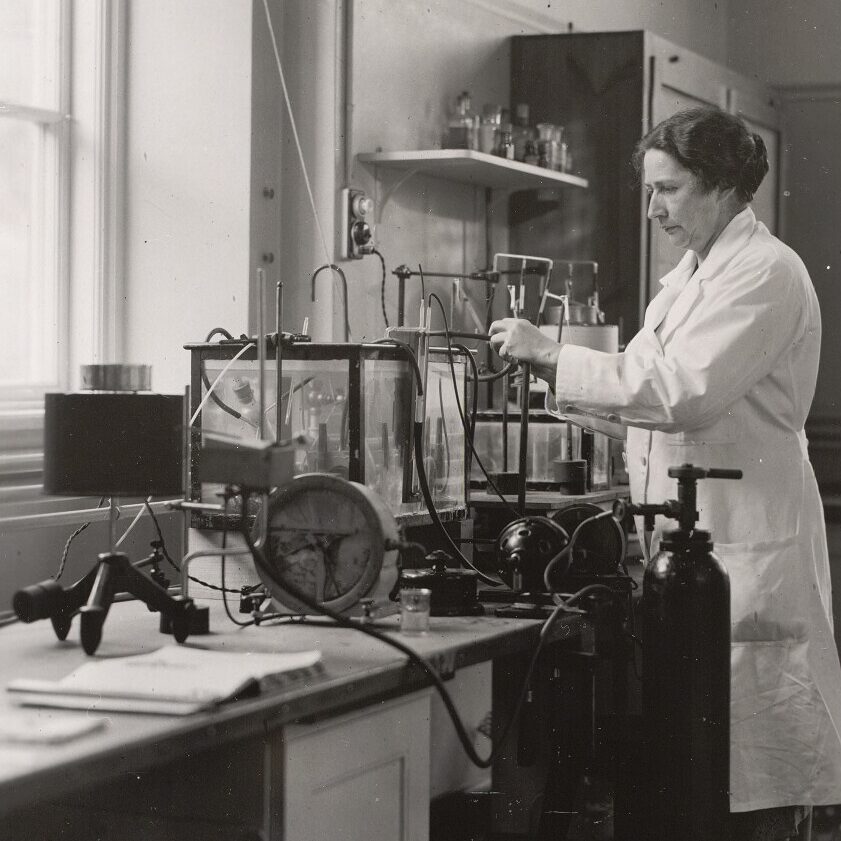
Photo: The Royal Danish Library
ABOUT MARIE KROGH

- Born Birthe Marie Jørgensen on 25 December 1874, died 25 March 1943
First person in Denmark to study the measurement of respiratory metabolism in humans - Established a medical practice in 1910 as a result of travelling to Greenland
Received her MD in 1914 from the University of Copenhagen - Clinical assistant in 1914–1915 on Christian Gram’s department at Rigshospitalet – Copenhagen University Hospital
- Physiology instructor (1915) and nutritional science instructor (1931) at the Danish National College of Education
Began using insulin on herself in 1923 as one of the first Danes to do so - Advocate for educational opportunities for women, including more teaching in the natural sciences
- Married to August Krogh
Source: Lex.dk
Haastrup, Lisbeth: Marie Krogh i Dansk Kvindebiografisk Leksikon. Retrieved 20 October 2024: https://kvindebiografiskleksikon.lex.dk/Marie_Krogh
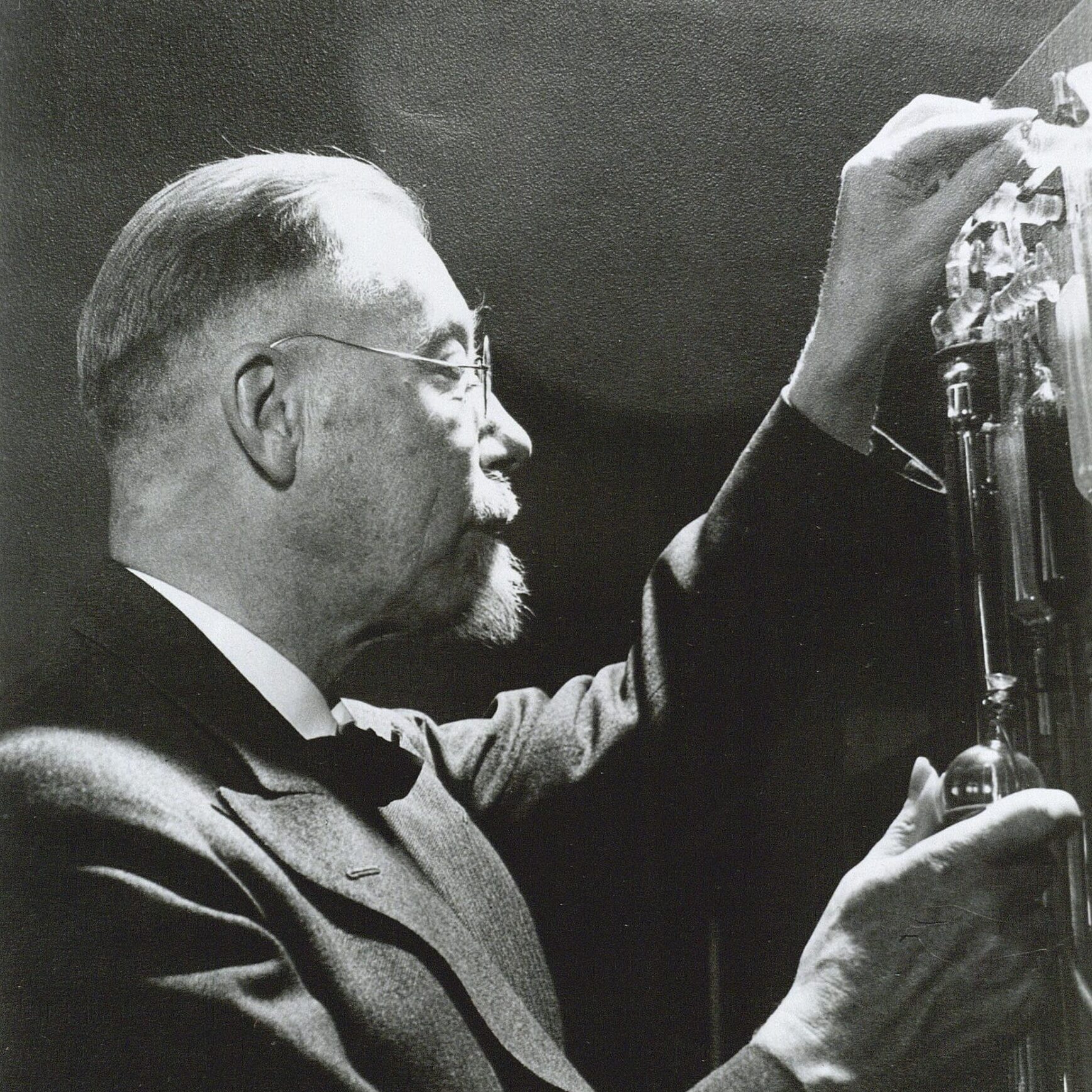
Photo: The Royal Danish Library
ABOUT AUGUST KROGH

- Born Schack August Steenberg Krogh 15 November 1874 in Grenå, Denmark, died 13 September 1949
- Danish physiologist and professor of zoophysiology, University of Copenhagen, 1916–1945
- Elected as a member of the Royal Academy in 1916. Resigned his membership in an open letter to the Royal Academy in 1945 due to an electoral difference of opinion with other members of the Academy
- Awarded the Nobel Prize in Physiology or Medicine in 1920
- Obtained exclusive rights to produce insulin in Scandinavia; began producing it in Denmark with doctor H.C. Hagedorn
- Married to Marie Krogh
Source: Lex.dk Larsen, Erik Hviid; Den Store Danske: August Krogh i Lex. Retrieved 20 October 2024: https://lex.dk/August_Krogh and the Royal Academy archives.
